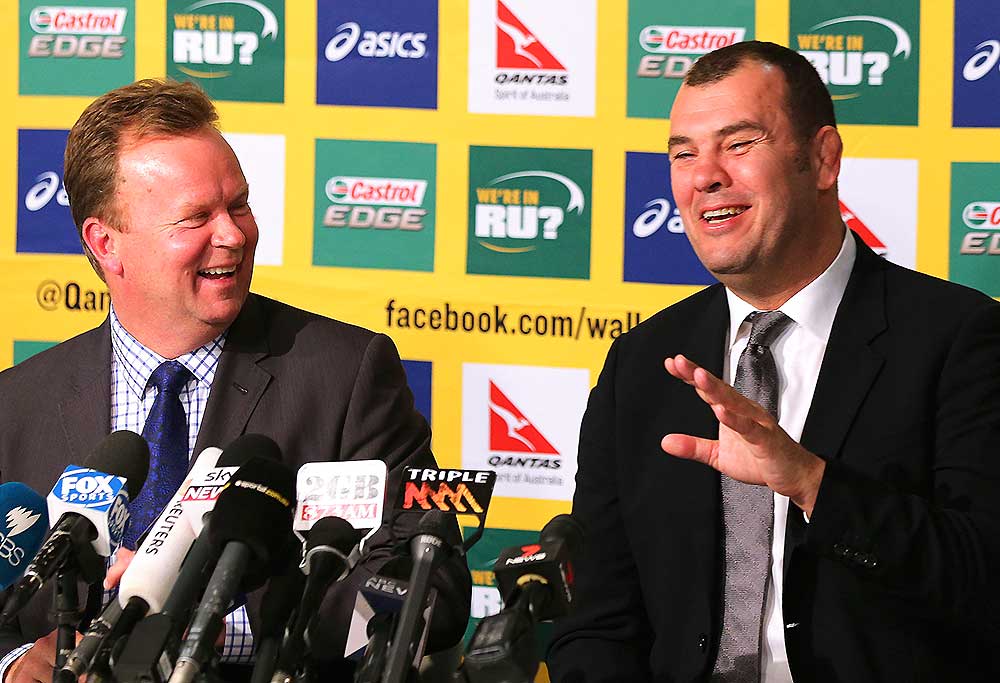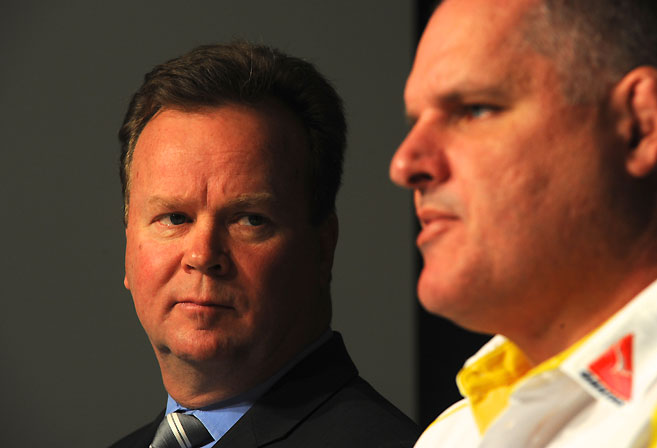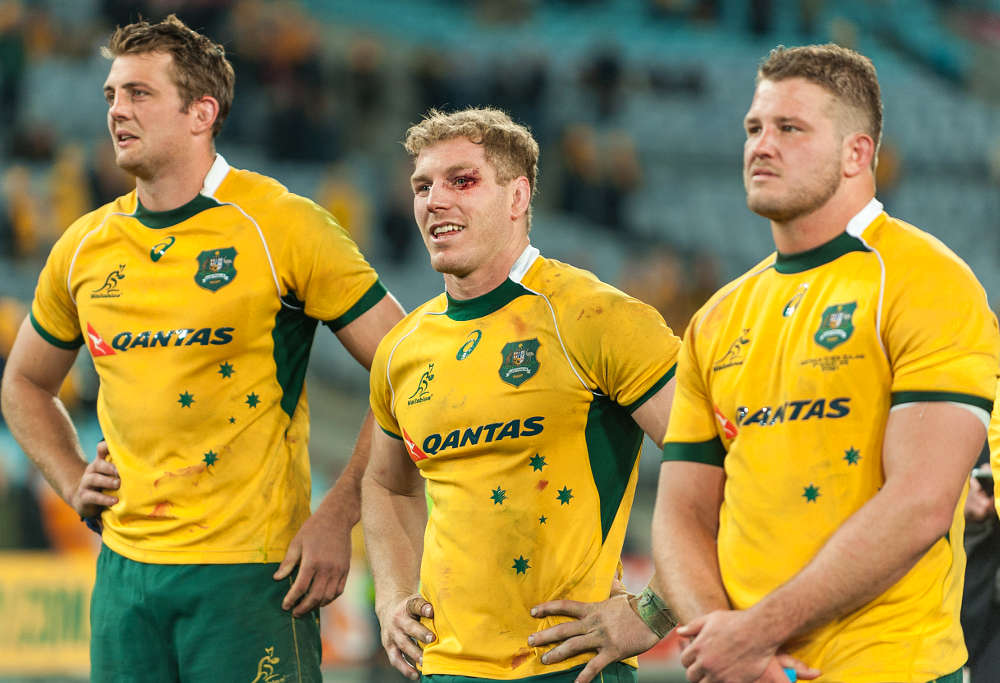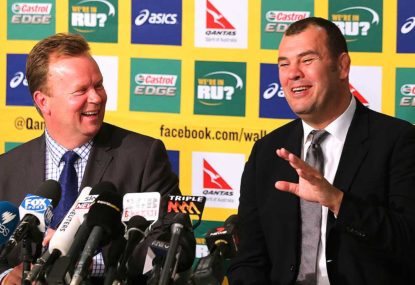Sometime soon, probably this week, the chief executive of the ARU Bill Pulver will conduct a one-on-one meeting with Wallabies coach Michael Cheika.
Pulver should tell Cheika that this has been a failed season for the Wallabies and that changes need to be made to his coaching style, selection procedures, coaching methods, coaching staff and virtually everything to do with the way the Wallabies, including the coach, present themselves on and off the field.
My guess is that Pulver won’t tell Cheika these hard truths.
How do we know this? Last week Pulver told Wayne Smith, The Australian’s chief rugby writer, that the problem for the Wallabies was one essentially of consistency.
“When we played England in June, their defence was excellent but we lacked creativity to get through. Since that point there have been moments of pure brilliance. We have put 40 minutes together in Test matches that are as good as I have ever seen. We just have managed to put it together for 80 minutes and I think that reflects the stage of the development of the team.”
Oh dear! What nonsense.
I would like to have seen these moments of “pure brilliance … that are as good as I have ever seen.” I watched every second of every Test the Wallabies played this season and I can’t recall any moments that had a patch on numerous moments from, say, Alan Jones’ Grand Slam Wallabies, Bob Dwyer’s 1991 Rugby World Cup Wallabies or Rod Macqueen’s 1999 Rugby World Cup Wallabies.
Pulver’s ludicrous beat-up of some of the play of Cheika’s Wallabies is yet another indication that he is too much of a scarf-wearing fan and not enough of a fearless, informed executive whose task it is to ensure that the Wallabies do not sink into mediocrity and drag Australian rugby down into this bog with them.
The executive as a fan is always a dangerous beast for the organisation he is running.

He (in this case with Pulver) is too inclined to hero worship the coach and his players. The clear-eyed judgment needed by a chief executive becomes clouded. And with his head and heart in the clouds, decisions that need to made about personnel, some of them involving sacking personnel, are not made.
An honest appraisal of the season would give the Wallabies a four out of ten assessment. And, to my mind, this is being somewhat generous to the Wallabies and Cheika.
This is not the mark obviously that Pulver will give Cheika. But it is a fair and, to be honest, a worrying mark for the future of the Wallabies and Australian rugby in general.
The Wallabies played 15 Tests in 2016. They won six of these Tests and lost nine of them. Seven of them comprised three losses to New Zealand, the best team in world rugby, and four to England, the second-best team in world rugby.
Argentina were defeated by the Wallabies in two Tests. The Wallabies defeated South Africa in one home (Australia) Test. Wins against Wales, Scotland and France (the Wallabies’ best win, in my opinion, with a second-string side) were away from Australia.
It is no disgrace or surprise that the Wallabies lost their three Tests to the All Blacks. Until Ireland defeated them at Chicago, they had won 18 consecutive Tests.
But the Wallabies should have won at least two Tests out of the four against England.
The Wallabies lost to the Springboks, one of the worst South African sides ever, in South Africa and to Ireland in Dublin.
Cheika’s winning ratio with the Wallabies in 2016 was 40 per cent. Eddie Jones was sacked as Wallabies coach in 2005 when his side lost five from 13 Tests, a ratio of 38 per cent.
There is no question in all of this that Cheika is “skating on thin ice,” as Glen Ella suggested. But Cheika’s record in 2016 should be given a ruthless, tough appraisal and the coach himself some ultimatums about performance outcomes next year. This should apply, too, to his staff and the ARU’s high-performance unit.
Readers of The Roar will know that this has been a persistent theme of mine throughout 2016.
Rather than re-hash my usual themes I’ll go to other rugby writers who seem to have jumped on board my bandwagon recently, after being critical of some of the things I’ve been writing this year.
Here is Wayne Smith recently in The Australian.
“Cheika needs a panel of two independent selectors who not only will query him around players and query him around how he intends to play … As well, Cheika also needs Michael Foley coaching the forwards …”
And again: “After four games, the Wallabies were conceding 37 points a match: after 10 matches it was down to 29 and by the end 27 … questions must be asked about defence coach Nathan Grey’s patterns, the more pertinent query needs to be asked about their mental state.”
I’d include the attack coach Stephen Larkham as another coach whose performance should be rigorously scrutinised.
Rod Kafer, again in The Australian, makes the point that it isn’t the Pulver notion of a lack of consistency that was the problem for Cheika’s Wallabies, it was the predictability of their play.
This is an entirely different matter and draws attention to the fact that Pulver is rather ignorant about the finer points of rugby theory and practice:
“But at the moment, the Wallabies are far too predictable, too easy to defend, because they don’t have a variety of attack that they probably need. There are probably half a dozen things around ‘consistency’ that could be explored. What does it really mean? Some of that might be the mental approach and how we play games and what we’re trying to do, and what we’re trying to achieve tactically.”
What Kafer, a smart analyst, is saying is that Cheika’s Wallabies had no idea of what might be the best way to play particular matches. Their play was essentially about moving the ball from one side of the field to the other, with the occasional hit-up and Bernard Foley as the invariable first receiver.
Teams knew that the Wallabies were going to play like this and stacked their defensive line.
The Wallabies did put in some contestable kicks to the wings early on in the Test against Wales and were able to open up Wales relatively easily.
But against England in the last Test of the season, the Wallabies went back to the side-to-side non-kicking game and were thrashed in the second half the match. This was how the Wallabies played and were beaten at Brisbane in their first Test of the season.
We have here in this stereotyped beginning and ending the completion of the vicious circle of poor tactics and strategy that ruined the 2016 season for the Wallabies.
Will Pulver use his authority to do what other and far more successful ARU chief executives (notably John O’Neill) have done in the past and force Cheika to drop his current group of assistant coaches and accept a new group of advisers?
Somehow, I doubt this will happen.
But if it did, I would keep Mick Byrne as the skills coach.
I would bring in Rod Macqueen, if he wanted to do the job, as a selector to play the same role with the Wallabies that Grant Fox plays as a selector with the All Blacks.
Michael Foley would make a difference to the effectiveness of the forwards, so bring him in.
And most importantly, I’d bring in Philip Fowler, the rugby whisperer who was the brains behind the Reds’ Super Rugby triumph, as the tactics coach.
Fowler gave Ewen McKenzie specific game plans for specific matches and conditions during the Reds’ great triumphal Super Rugby season. He has just finished doing the same sort of job for Eddie Jones during the November Test season.
He lives in Brisbane and has made overtures to work for the Wallabies which, to the best of my knowledge, have not even been acknowledged.
The point about all this is that Cheika was brought in by Pulver, in the wake of the Ewen McKenzie debacle, on Cheika’s terms. Ever since then, Cheika has done things his way. These ways need to change significantly.

Paul Cully has a very worrying warning in The Sun-Herald about the inability of the Wallabies coach to improve his methods this season.
“The Michael Cheika recipe did not work in 2016 and it won’t work in 2017. Reports of Cheika laying down the law at training in the last week of the northern tour stunned me. There must be blokes in that Wallabies side … who are thinking: ‘Why is this bloke still shouting at me?'”
It is time, obviously, to call Cheika to account. The history of the relationship between Pulver and the clueless ARU board, though, suggests that this won’t be done.
The point here is that if Cheika has had a bad year as the coach of the Wallabies, the ARU board and Pulver have had a disastrous year.
Their report card would give them a mark of three out of ten, with the gold medal success of the Pearls at the Rio Olympics being the entire reason for the three points I’ve given the ARU board.
The Guardian recently ran an article headed: ‘Has Australia Fallen Out Of Love With Rugby?’
The article noted that about 7,000 players have given up playing club rugby. Admittedly, female participation has grown on the back of the sevens program. Out of 20 top sports played by Australian children, however, rugby ranked 18th for children over 14 and over in participation rates. Horse-riding and volleyball ranked higher!
Club rugby, the heartland of Australian rugby, is struggling and is totally disenchanted with the ARU and with Pulver.
The Guardian quoted a public letter to the ARU from the former Wallaby captain, Nick Farr-Jones.
“There are grave concerns with the rugby community that the continuing failure of the Australian Rugby Union to acknowledge and support the grassroots of the game will accelerate an already alarming decline in both the participation and support of the game in Australia.”
This cry from the heart and the heartland from one of the most distinguished figures in Australian rugby, on and off the field, should have provoked Pulver and the ARU to hold urgent public and private meetings with people like Farr-Jones to get to the heart of problems facing Australian rugby and come up with answers to create better days for the code.
But instead, the Farr-Jones letter has received hardly any acknowledgement.
This is shameful behaviour on the part of the ARU Board. But it is typical. This is the least effective and least diverse, in terms of rugby interests, I have seen in my 30 or so years of covering rugby.
It is a board, too, that is clueless about the real interests of the rugby game.
Where is the leadership in getting rid of the failed Giteau Law experiment?
Where is the leadership in the interests of the grassroots game that pays a player, David Pocock, $750,000 for a year in which he doesn’t play rugby in or for Australia?
This is a board that is obsessed about gender politics and neglects real issues of conflict of interest.

I was struck by comments made by Ric Charlesworth in connection with his book on coaching, World’s Best.
“One of the Australian cricket selectors, Mark Waugh, appears on television as an expert commentator and gives opinions on form and performance … this appears an extraordinary conflict of interest.”
For Mark Waugh, read ARU board member John Eales.
How is it that Eales is allowed by the ARU to appear on television as an expert commentator when the conflict of interest involved in him commentating on players and coaches he (along with the other board members) legally employs is so obvious?
This indulgence to admittedly one of the greatest of all the Wallabies is an obvious sign of a board and a chief executive that is out of touch with their responsibilities to the wider interests within the rugby game.
I’m sorry to end 2016 on such an unhappy note but I am afraid the mediocrity of this year in the Wallabies and within the ARU will leak through to 2017.
I cannot see any great future for the Wallabies until the rugby heartland do what the rugby league heartland is trying to do with their essentially self-appointed board and overthrow the power group that has captured the ARU board.
The test that will reveal if the ARU board is up to running rugby in the interests of all the stakeholders is whether after the Cheika-Pulver meeting there is a significant change in the coaching staff of the Wallabies.
Somehow, I wouldn’t hold my breath.
































































































